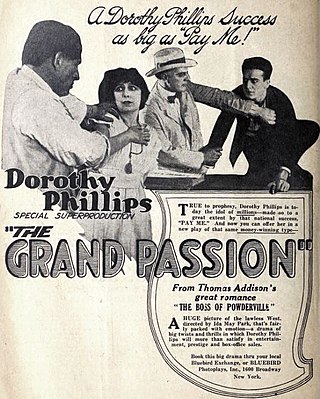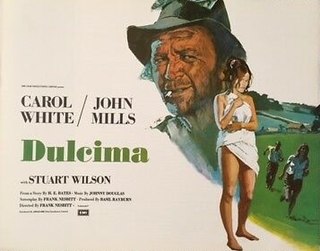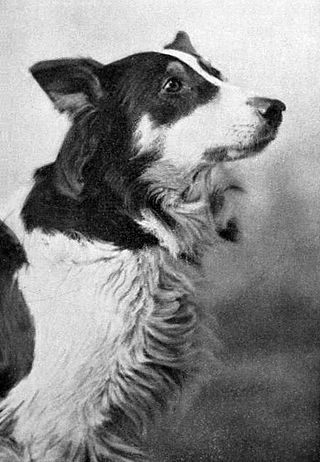
Albert Payson Terhune was an American author, dog breeder, and journalist. He was popular for his novels relating the adventures of his beloved collies and as a breeder of collies at his Sunnybank Kennels, the lines of which still exist in today's Rough Collies.

Four Sided Triangle is a 1953 British science-fiction film directed by Terence Fisher, adapted from the 1949 novel by William F. Temple. It stars Stephen Murray, Barbara Payton and James Hayter. It was produced by Hammer Film Productions at Bray Studios.

Jean, also known as the Vitagraph Dog (1902–1916), was a female collie that starred in silent films. Owned and guided by director Laurence Trimble, she was the first canine to have a leading role in motion pictures. Jean was with Vitagraph Studios from 1909, and in 1913 went with Trimble to England to work with Florence Turner in her own independent film company.

The Painted Hills, also known as Lassie's Adventures in the Goldrush, is a 1951 drama western film produced by Metro-Goldwyn-Mayer (MGM) and directed by Harold F. Kress.

The Grand Passion is a 1918 American silent Western film directed by Ida May Park and starring Dorothy Phillips, Jack Mulhall, and Lon Chaney. Ida May Park also wrote the screenplay, based on a novel The Boss of Powderville by Thomas Addison. The film was allegedly shown in some theaters under the title of The Boss of Powderville.

Dulcima is a 1971 British drama film directed by Frank Nesbitt. It was entered into the 21st Berlin International Film Festival. The story revolves around a love triangle: a farmer, his housekeeper and the handsome neighbour.

The Love That Lives is a 1917 American silent drama film produced by Famous Players Film Company and distributed through Paramount Pictures. The film stars Pauline Frederick and was directed by Robert G. Vignola. The film is based on the story "Flames of Sacrifice", by Scudder Middleton.

Parking Space is a 1933 American Pre-Code short animated film by Walter Lantz Productions, starring Oswald the Lucky Rabbit. It is the 77th Oswald film created during the Lantz era and the 128th to feature the character.

Tall, Dark and Handsome is a 1941 gangster comedy film directed by H. Bruce Humberstone and starring Caesar Romero, Virginia Gilmore, and Charlotte Greenwood. It was released by Twentieth Century Fox.

Jack Harvey was an American film actor, director and screenwriter, noted for his short films of the silent period.

A Dog's Love is a 1914 American short silent fantasy drama film with subtitles, directed by Jack Harvey on his directorial debut. It stars Shep the Dog, Helen Badgley, and Arthur Bauer. The film is about a dog who loses his best friend, when a young girl is killed in an automobile accident, and focuses on his emotions in dealing with his loss. Well-received because of its "universally appealing" theme, the dog's emotions were reported as surpassing the child's histrionics.

Shep's Race with Death is a 1914 American short silent drama film, directed by Jack Harvey for the Thanhouser Company. It stars Shep the Dog, Mrs. Whitcove, and J.S. Murray. The film about a "collie dog [who] wins a race with death, saves the life of his mistress, and causes a happy family reunion", was released on November 1, 1914.

Shep, or The Thanhouser Dog or Shep the Dog, was a male collie dog who starred in a number of silent films made by the Thanhouser Company.

Morgan Jones was an American silent film actor and writer.

The 1937 Fox vault fire was a major fire that broke out in a 20th Century-Fox film-storage facility in Little Ferry, New Jersey, United States, on July 9, 1937. Flammable nitrate film had previously contributed to several fires in film-industry laboratories, studios, and vaults, although the precise causes were often unknown. In Little Ferry, gases produced by decaying film, combined with high temperatures and inadequate ventilation, resulted in spontaneous combustion.

Jean and the Calico Doll is a 1910 short film directed by Laurence Trimble for Vitagraph Studios. It is the first film starring his own dog Jean, a female tri-color collie soon to be famous as the Vitagraph Dog. The drama marks the film debut of Helen Hayes, the first of two films she made with the famous dog in 1910.

Barriers of Society is a 1916 American silent drama film directed by Lloyd B. Carleton. Universal based the film on the story written by Clarke Irvine and adapted for the screen by Fred Myton. The feature film stars Dorothy Davenport, Emory Johnson, and an all-star cast of Universal contract players.
The Dawson Film Find (DFF) was the accidental discovery in 1978 of 372 film titles preserved in 533 reels of silent-era nitrate films in the Klondike Gold Rush town of Dawson City, Yukon, Canada. The reels had been buried under an abandoned hockey rink in 1929 and included lost films of feature movies and newsreels. A construction excavation inadvertently uncovered the forgotten cache of discarded films, which were unintentionally preserved by the permafrost.

Fighting the Flames is a 1925 American silent drama film directed by B. Reeves Eason. It is not known whether the film currently survives.

On the morning of June 13, 1914, a disastrous fire and a series of related explosions occurred in the main film vault of the Lubin Manufacturing Company in Philadelphia, Pennsylvania. Several possible causes for the blaze were cited at the time, one being "spontaneous combustion" of highly flammable nitrate film, which was the motion picture industry's standard medium for cameras throughout the silent era and for the first two decades of "talking pictures". Millions of feet of film were consumed in the flames, including most of the master negatives and initial prints of Lubin's pre-1914 catalog, several of the company's recently completed theatrical prints ready for release and distribution, a considerable number of films produced by other studios, inventories of raw and stock footage, hundreds of reels documenting historic events that occurred between 1897 and early 1914, as well as other films related to notable political and military figures, innovations in medical science, and professional athletic contests from that period. While this fire was not a decisive factor in Lubin's decline and bankruptcy by September 1916, costs associated with the disaster only added to the corporation's mounting debts, which led to the closure or sale of its remaining operations the following year.


















